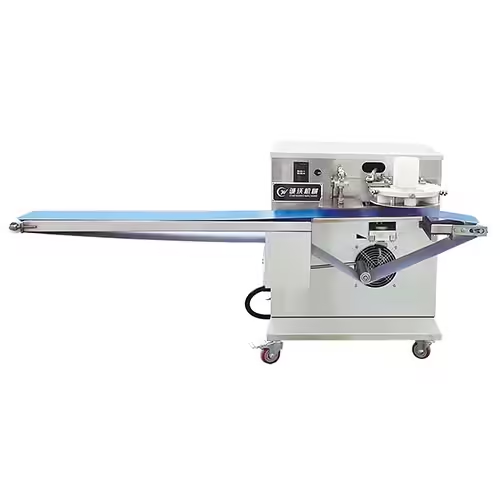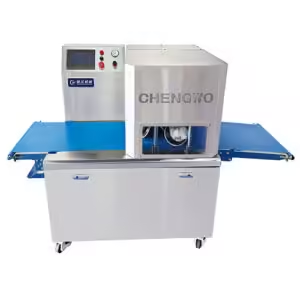



In today’s fast-paced food production environment, keeping up with demand and maintaining product consistency has become a major challenge. The key to overcoming these challenges lies in adopting advanced industrial food equipment that is designed to optimize production efficiency, improve food safety, and reduce operating costs. As the food manufacturing industry continues to grow and evolve, investing in cutting-edge food processing technology will not only help manufacturers meet the current demands but also prepare them for the future.
This blog will explore the various aspects of industrial food equipment, including the advantages of upgrading your production line, the types of equipment available, and emerging trends in the industry. We’ll also discuss how such investments can future-proof you
Industrial food equipment has undergone significant transformations over the years. The development from manual labor to highly automated systems has drastically changed the way food is processed, packaged, and distributed. In the past, food production was heavily dependent on manual labor, resulting in slower production times, less consistency, and greater potential for human error.
With the advent of automation and technology, industrial food equipment has revolutionized the industry, making food processing faster, safer, and more efficient.
Upgrading your production line with the latest industrial food equipment can offer numerous advantages that go beyond simple cost savings.
Modern equipment helps to significantly reduce production times and operational costs. Automated machinery operates at higher speeds and with less downtime, allowing for greater throughput and fewer disruptions in the production process.
Advanced industrial food equipment provides better control over the production process, ensuring that every product is consistent in quality and appearance. This consistency is vital for maintaining brand reputation and meeting customer expectations.
With hygiene being a top priority in the food industry, modern equipment includes features such as Clean-in-Place (CIP) systems that minimize the risk of contamination. Materials used in equipment are often designed to comply with stringent food safety regulations, ensuring that every batch meets health standards.
As demand for your products increases, modern industrial food equipment offers scalability. Modular systems allow for easy integration of new components or machines, so your production line can grow without the need for a complete overhaul.
Sustainable equipment solutions can help reduce energy consumption and minimize waste. Energy-efficient machines not only lower operating costs but also contribute to reducing the overall environmental footprint of your production facility.
When considering new equipment for your production line, it’s essential to understand the different types of machinery available. Here are some of the key categories of industrial food equipment that you should be familiar with:
| Equipment Type | Function | Suitable For |
|---|---|---|
| Mixers & Blenders | Combine ingredients uniformly | Baked goods, sauces, meat processing |
| Conveyors | Transport materials across the line | All production types |
| Fillers & Depositors | Portion and dispense products accurately | Dairy, bakery, ready meals |
| Packaging Machines | Wrap, seal, and label finished goods | Snacks, beverages, frozen foods |
| Cutting & Slicing Machines | Portion ingredients or final products | Meats, vegetables, cheeses |
| Thermal Processing | Cook, bake, pasteurize, or sterilize products | Beverages, canned foods |
| Weighing & Inspection | Ensure weight accuracy and product quality | Packaged goods, fresh produce |
These machines play a vital role in ensuring that every stage of the food production process is optimized for efficiency, hygiene, and consistency.
Choosing the right industrial food equipment for your production line is a critical decision that requires careful consideration. Here are some factors to keep in mind when selecting equipment:
The type of products you produce will determine the kind of equipment you need. Whether you’re processing beverages, dairy, baked goods, or meats, you’ll need machines specifically designed for the type of food you’re working with.
Reliability is key when choosing industrial food equipment. Invest in equipment that offers high performance, durability, and minimal maintenance requirements to reduce downtime and avoid costly repairs.
While initial costs may be a concern, investing in scalable equipment will ensure your production line can grow as your business expands. Choose machinery that can be easily upgraded or adapted to handle increased demand.
Food safety regulations vary by region, so ensure that the equipment you select complies with industry standards and regulations, such as HACCP, FDA, and ISO certifications.
As technology continues to advance, industrial food equipment is becoming more intelligent, efficient, and connected. Here are some of the key trends shaping the future of food production:
With IoT integration, food manufacturers can track the performance of their equipment in real time. Sensors can monitor various metrics like temperature, humidity, and machine status, providing valuable data to optimize operations and prevent breakdowns.
The use of robots in food processing is on the rise. From sorting to packaging, robotics can help reduce human labor and improve consistency. Automated systems are also capable of performing complex tasks more efficiently than ever before.
AI can help predict when equipment is likely to fail or require maintenance. This predictive approach minimizes unplanned downtime and helps extend the lifespan of machinery.
With an increasing emphasis on sustainability, manufacturers are designing equipment that uses less energy, minimizes waste, and reduces water consumption. Such solutions are not only environmentally friendly but also cost-effective in the long run.
Adopting advanced industrial food equipment is essential for any food manufacturer looking to stay competitive in an ever-evolving market. By investing in modern technology, you can boost production efficiency, ensure high-quality products, and meet food safety standards. Additionally, forward-thinking equipment can provide scalability, flexibility, and sustainability, helping you prepare for the future of food production.
Are you ready to future-proof your production line? Contact us today to explore the latest industrial food equipment solutions and find the perfect fit for your needs.
How do I know which industrial food equipment is best for my business?
Start by evaluating your production needs and the type of food products you manufacture. Consider equipment that can handle your specific requirements while also allowing for future growth.
Can I upgrade my current equipment to keep up with industry advancements?
Yes, many industrial food equipment manufacturers offer upgrade kits and modular systems that can be added to existing machines to improve their performance and functionality.
What are the maintenance requirements for industrial food equipment?
Maintenance needs vary depending on the equipment type and usage. Regular cleaning, inspection, and servicing are crucial to ensuring that machines run smoothly and comply with food safety regulations.

